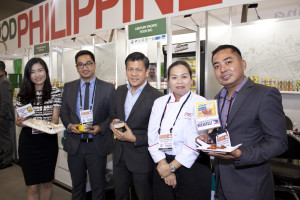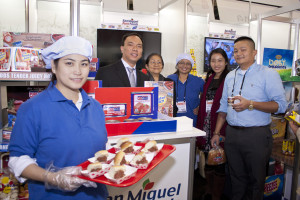PH Foods showcased at ’17 Winter Fancy Food Show
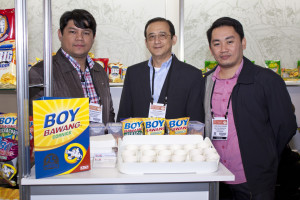
From left to right, Karim Mangondaya, Alex Alianan and Lugin Paul Arguez of Boy Bawang. INQUIRER/Wilfred Galila
SAN FRANCISCO – Twenty exhibitors representing classic brands as well as new products from the Philippines showcased their goods at the Food Philippines Pavilion at the Winter Fancy Food Show held at the Moscone Center on January 22 to 24.
Established in 1954, the Winter Fancy Food Show owned and produced by the Specialty Food Association, a not-for-profit trade association for food artisans, importers and entrepreneurs, has become the largest marketplace devoted exclusively to specialty foods and beverages in North America.
Through the years, the food show has helped launch now popular brands into the mainstream food market. This year, more than 1,400 food companies from around the world presented their various and diverse products.
Distinct PH flavors
Capitalizing on the country’s distinct flavors blended from centuries of cross-cultural fusions and regional influences, the Food Philippines Pavilion was organized by the Center for International Trade Expositions and Missions (CITEM) under the Department of Trade and Industry (DTI) in the Philippines along with the Philippine Trade and Investment (PTI) Center, the foreign service arm of DTI, of the Philippine Consulate General in San Francisco. The export promotions arm of the DTI, CITEM brings manufacturers and exporters from various industries (food, fashion and home) from the Philippines to different markets worldwide.
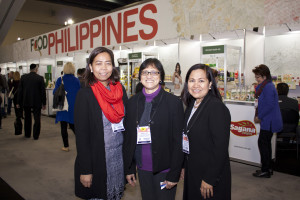
From left to right, Eva Marie Mariquina, Rosalie Yasay and Victoria Arellano of CITEM and PTI. INQUIRER/Wilfred Galila
“We do programs for them to develop the industry,” Eva Marie Mariquina, Assistant Division Chief of Special Projects, Value Creation and Promotion Department, CITEM, said. “We do product development and help them with compliances (packaging, content, labeling, etc.) to make them ready for the international market.”
It is the fourth participation of the Philippines in the annual food show and the third year that there is a Philippine pavilion. From what started as a 10’x10’ booth in 2013, the Philippine pavilion has grown featuring ten companies last year to twenty this year.
“The intention is to put Philippine food products in the market and expand,” Rosalie Yasay, Trade Assistant, PTI, said.
New companies
Out of the 20 companies that comprised the Food Philippines Pavilion, 12 were new, such as Xroads (crossroads) LLC of the Xroads Philippine Sea Salts brand of artisanal culinary sea salts, SIMEX International with their saba or Philippine plantain bananas, Raw Brown Sugar Milling Co., Inc. with their brand of organic raw brown sugar, Muscovado, and Fruits of Life, Inc. of the Lipa brand of natural fresh coconut water and coconut meat.
Nine were big and well-known companies and brands in the Philippines such as San Miguel Pure Foods with their line of meat and dairy products, Republic Biscuit Corporation, more popularly known as Rebisco, with their line of snacks, cakes and biscuits, Century Pacific Food, Inc. of the Century Tuna brand, Monde M.Y. San with their line of biscuits and snacks, and KSK Food Products of the Boy Bawang (garlic) brand of corn snacks.
Familiar flavors
If you were born and raised in the Philippines or have spent a significant time living there, more than not you would be quite familiar and, most likely, have developed a taste for many of the classic brands and line of products from Philippine food industry giant and subsidiary of one of the oldest companies in the Philippines San Miguel Pure Foods.
Among the products that would be familiar to those who know are Pure Foods Tender Juicy Hotdogs and San Miguel Gold Label Best of the Philippines ice cream brand, also known in the Philippines as Magnolia. But outside of the Philippines, San Miguel Pure Foods’ products are not that well known.
“Our products are quite young to export sales. We were concentrating on domestic sales alone,” Edwin Chotangco, Unit Sales Manager, San Miguel Pure Foods, said. “But four to five years ago, we started to look outside the Philippine market. The concentration right now is to expand, to bring our brands to the Filipinos abroad.”
Another big company with brands and products that have become a staple of food culture in the Philippines is Monde M.Y. San Corporation, makers of the famous Sky Flakes crackers, with their line of crackers and cookies that evoke a feeling of nostalgia. The company has expanded its products to include cracker sandwiches with flavors reminiscent of snacks one would have had in the Philippines.
Reminder of home
“When you eat our product, it always reminds you of ‘home,’” Arian Rose Jobel Arcinas, Line Manufacture Head, Monde M.Y. San Corporation, said. Flavors they have launched for their cracker sandwiches include sweet Tsokolate (chocolate) that reminds you of crackers dipped in tsokolate de batirol, Condensada, reminiscent of crackers dipped in condensed milk, and Sweet Mantikilya (margarine) reminiscent of a quintessential Filipino snack of a slice of bread dabbed with margarine and sprinkled with sugar.
“There’s always a basis for all of the flavors. Home is where the heart is,” Arcinas said.
“It’s our first time to participate in the show,” Rachel Favis, Export Supervisor, Monde M.Y. San Corporation. “Our primary goal is to introduce our new products because Sky Flakes has already been here for the longest time.”
Innovating
Rebisco, which started out as small neighborhood bakery in 1963 and has grown into a big company with products that are loved by Filipinos worldwide, has built a reputation and expertise in the biscuit industry.
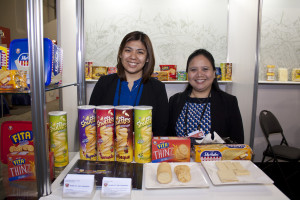
From Left to Right, Arian Rose Jobel Arcinas and Rachel Favis of Monde M.Y. San. INQUIRER/Wilfred Galila
“Rebisco is continuously innovating what is suitable for the market,” Annielane Moreno, Assistant Vice President for Export International Business Group, Rebisco, said. Their first time at the pavilion but having been exporting to over 50 countries, “we want to increase our presence in North America. I really appreciate the potential of the region. I see a lot of opportunities.”
A household name in corn snacks that is already sold in 35 countries including the U.S., Boy Bawang also joined the pavilion for the first time.
“We want to reach all people who want different kinds of snacks,” Karim Mangondaya, Export Manager, KSK Food Products, said.
From the original garlic flavor, Boy Bawang has added a variety of flavors that includes adobo and lechon manok (chicken barbecue).
“We have increased the number of items that we have,” Lugin Paul Arguez, Export Import Manager, KSK Food Products, said. “Also the quality of corn has greatly improved.”
Veteran exhibitor
A “veteran” of the Food Philippines Pavilion at the food show for four years, Century Pacific Food Inc. is another big company that carries popular brands.
“Around 15 years ago, Century Tuna was exported to the U.S.,” Greg Banzon, VP and general manager, Century Pacific Food Inc., said. “We go through some Asian distributors and we also have a mainstream account. We’re making sure that we are positioned and have the platform to serve the market.”
Among the big and older brands are smaller and newer ones such as Lipa Fresh Coconut Water carried by Fruits of Life Inc.
“The experience is good. When you have a product that is very acceptable, you don’t have to explain what you are. So they just know and they would just tell you if your good or not,” Sonia Tan, General Manager, Fruits of Life, Inc., said.
PH salts
Xroads Philippine Sea Salts is a brand that could be termed as grassroots, organic and artisanal, produced in the Philippines with local salt farmers.
“It was the salt that found us,” Leni DiCarlo, founder and CEO, Xroads LLC, said. “We went to the Philippines and I bought it back as gifts for a lot of my chef friends and the next thing you know, they’re knocking on my door asking for more.”
Now Xroads caters to the very best chefs and restaurants across the country, from Thomas Keller of The French Laundry to Thomas Weibull of Clift, to chefs in the east coast, Canada, and Mexico, with regional and national distribution on a small scale.
Xroads’ newest and most interesting product is called Asin (salt) Tibuok (unbroken), a big whole unbroken piece of salt.
“It comes from a very small island in Bohol and there is only one producer left in all 7,100 plus islands that we have in the Philippines,” DiCarlo said. “The rest of the global community needs to see that we have some beautiful products coming from the country.”
Muscovado
Another organic and artisanal product is muscovado or raw brown sugar by Raw Brown Sugar Milling Co. Inc.
“We own the plantation of the sugar cane and the mill,” Norrica Palma, U.S. Trade Partner, Raw Brown Sugar Milling Co. Inc., said. “We are able to have consistent quality control over our products.”
Raw Brown Sugar has three Muscovado variants: rocks, which have a strong molasses flavor, powdered, a milder flavor, and cube, a compacted powder that is precision cut to almost perfect cubes.
“We are trying to evolve into various products,” Palma said. “It’s all grown and sourced in the Philippines. Our plantation is USDA organic and we have a European certification.”
Unanimous among the participants at the Philippine Foods Pavilion is the intention to break into and be recognized in the mainstream North American market. This intention is shared by CITEM and PTI. With the type of products, most of which are staples in the American food market from baked goods to processed meats, all are hopeful about this prospect while those companies who have broken through recognize the need for more promotion of their products.
Breaking into mainstream
“Hopefully, I’d be able to break into the mainstream and be accepted,” Tan of Lipa said. “Most of the coconut water here are made in Thailand but we do have a lot of coconut in the Philippines.”
“It’s the manufacturer’s dream to have it in the mainstream,” Alex Alianan of North Ridge Foods, distributor of Boy Bawang, said. “So, we are also wanting this, and gradually finding a way through it.”
“We made it to the mainstream, but we’re slotted in the Asian section for now,” Banzon of Century Pacific Food Inc., said. “Eventually, I think, it’s going to cross over to the main section.
“The U.S. is the number one market that we are really tapping,” Victoria Arellano, Marketing Officer of Event Services Division, Project Management Department, CITEM, said. “We really need to go mainstream.”
Going mainstream could also be a form of preservation and continuation of Filipino food heritage in a global scale.
“As explained by the consul general, the first generation Filipino in the U.S. is understandably your market for sure but they are already declining” Say said. “What’s growing are the second and the third generations. Although they are exposed to Filipino food they go to the mainstream stores. So we have to put our products in those stores so that it’s accessible to second and third generation Filipinos”
Surge of interest
There has been a surge of interest in Filipino food in the U.S. in recent years, to the point that it has been recognized as an emerging trend and declared to be “the next big thing” by various chefs and food critics.
“I think it’s high time that the Philippines elevates its image as a food capital of the world,” Moreno said. “It’s really up to us to highlight it, such as in these types of events.”
“Filipino food is here. It’s recognized on a global level,” DiCarlo, of Xroads Philippine Sea Salts, said. “Support Philippine products, don’t ask for a tawad (haggle), support it for what it is because there are true artisans out there who are trying to make a real living so we need to pay them real wages.”
“I encourage the Filipinos in the U.S. that whenever they go to the supermarket and there are Filipino products that they should buy them because it helps move the product,” Say said. “We have to buy and help our food producers and exporters in the Philippines.”

